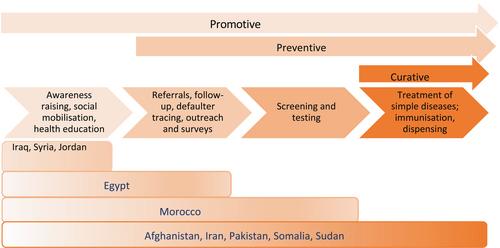Mapping and analysing community health worker programmes in the Eastern Mediterranean region
Abstract
Background
Community health worker (CHW) programmes are increasingly being recognized as an important strategy that can help to strengthen comprehensive primary health care (PHC), as the foundation of work towards achieving universal health care (UHC) and meeting the Sustainable Development Goals (SDGs). The WHO Regional Office for the Eastern Mediterranean undertook a situational analysis of CHW programmes in the Region to better understand the current situation and the issues involved.
Methods
A two-step process was employed: a review of available literature on CHWs in the Region was conducted, followed by a survey of CHW programmes in the region, focussing on programmes that were country-led and country-wide.
Results
Thirteen countries were found to have community health worker programmes with varying governance and programmatic structures. Broadly, two categories can be distinguished: (a) several countries have well established and mature national CHW programmes that are in most cases supported by external donors but driven and coordinated by national governments; (b) a greater number of countries that have smaller, emerging government or partner led projects and programmes. A few countries have deliberately opted for other models to strengthen primary care and community outreach, for example, through community nursing.
Conclusion
CHW programmes play an increasingly important role in primary health care in the Eastern Mediterranean Region, providing promotive, preventive, and emergency services. This bodes well for efforts to strengthen and embed comprehensive primary health care as the foundation of national health systems, to improve health emergency preparedness, achieve UHC and meet the SDGs. Nonetheless, all but a few programmes face challenges of weak governance, fragmentation and unreliable support, similar to those in other countries. However, the main finding of the analysis was that the role of CHWs in countries' health service delivery is woefully under-researched in almost all countries in the region, and more research to better understand and support programmes in the context of local health system contexts is urgently needed.


 求助内容:
求助内容: 应助结果提醒方式:
应助结果提醒方式:


